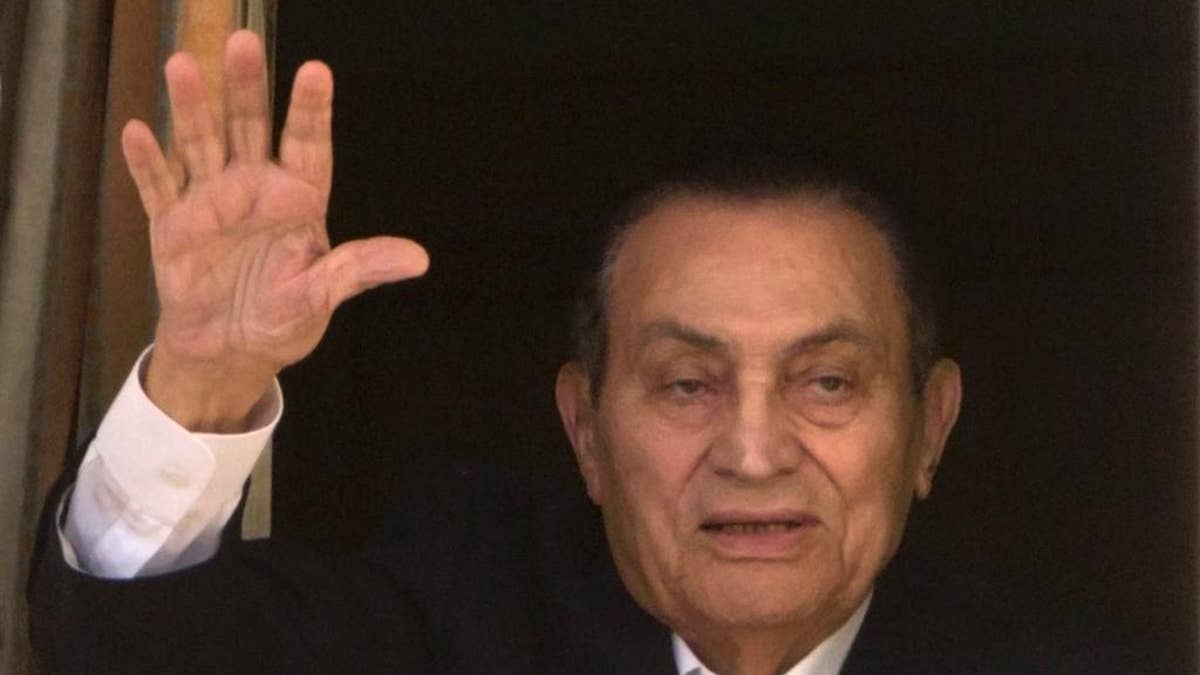
FILE - In this Monday, April 25, 2016 file photo, ousted Egyptian President Hosni Mubarak waves to his supporters from his room at the Maadi Military Hospital in Cairo, Egypt. Mubarak returned home on Friday, Match 24, 2017, free following his release from custody after legal proceedings that took years since his 2011 ouster — years during which the country witnessed major upheavals and rights activists saw their hopes scuttled that the autocrat would face justice for the deaths of hundreds who defied his rule. (AP Photo/Amr Nabil, File) (The Associated Press)
CAIRO – Key events in the life of the ousted Egyptian president, who has been released from detention and returned home.
— Oct. 15 1981: Mubarak takes office after his predecessor, Anwar Sadat, is assassinated by Islamic militants during a military parade. Mubarak, Sadat's vice-president, survives with a minor hand injury.
— Mubarak implements emergency laws as part of his battle against militants and expands police powers.
— In one of his first moves, Mubarak says Egypt will stick to the 1979 peace treaty with Israel, the first by any Arab nation with the Jewish state.
— Mubarak becomes a major mediator in the Arab-Israeli peace process, remaining a consistent US ally bolstered by billions of dollars in American aid.
— During the 1990s, an Islamic militant insurgency — aiming to set up an Islamic state — attacks policemen, assassinates politician, and targets foreign tourists, one of the country's key sources of revenue.
— 1995: Militants attempt to assassinate Mubarak during a visit to Ethiopia.
— 1997: Mubarak responds by arresting thousands, crushing the movement.
— Sept. 1999: Mubarak is re-elected for a fourth term in a staged, single-candidate referendum in which he wins over 90 percent of the vote.
— Feb. 2005: Mubarak engineers constitutional amendments that, according to critics, guarantee ruling-party victories in elections.One bans religious political parties, blocking the Muslim Brotherhood from officially participating in political life.
— 2005: Mubarak allows the first ever multi-candidate presidential election, which he wins easily over 10 other candidates amid charges of voter fraud and intimidation.
— April 2008: Bread riots turn violent. Mubarak's government had subsidized staples such as bread and cooking oil, and the butane gas used for cooking. He fires up military ovens to help quell discontent.
— 2010: Parliamentary elections are widely deplored as rigged, and the Brotherhood responds by withdrawing its candidates, who ran as independents, from a second round of voting.
— Jan. 25, 2011: Thousands of anti-government protesters clash with police in Cairo during a Tunisia-inspired demonstration to demand Mubarak's removal. The day marks the start of the Arab spring in Egypt.
— Feb. 11: After three weeks of massive protests against his rule, Mubarak steps down, handing power over to the military.
— April 13: Authorities detain Mubarak and his two sons in an investigation into corruption, abuse of power and the killing of protesters. A month later, Mubarak is ordered to stand trial.
— Aug. 3: Mubarak's trial starts in Cairo. From the defendant's cage, Mubarak denies all charges against him.
— Feb 22, 2012: Mubarak, who had rarely spoken during the trial, turns down his last chance to address the court during the defense's final arguments.
— June 2: Mubarak is sentenced to life in prison. He's ferried by helicopter from the police academy where the trial was held to Cairo's Torah Prison where his sons and members of his regime have been either serving prison sentences or being held pending trials over a variety of corruption charges.
— Jan, 2013: Mubarak is granted a retrial from the appeals court.
— Nov. 29, 2014: Murder charges against Mubarak are dismissed, and his security chief is acquitted over the killing of protesters during the 2011 uprising.
— Mubarak is also acquitted of corruption charges that he faced along with his sons Alaa and Gamal — his one-time heir apparent — as the statute of limitations on the case expires.
— June 4, 2015: Egypt's highest appeals court orders the retrial of Mubarak on charges that he failed to prevent the killing of hundreds of protesters during the 2011 uprising. The ruling sets a trial date for the third time.
— May: Cairo Criminal Court sentences Mubarak to three years and fines him and his sons 125 million Egyptian pounds following his conviction for embezzling funds earmarked for the maintenance and renovation of presidential palaces.
— Jan. 9, 2016: An Egyptian court upholds a three-year prison sentence for graft. It is considered already served by the former president and his two sons based on their time spent in detention.
— March 2, 2017 Egypt's top appeals court issues its final ruling, acquitting Mubarak of charges that he ordered the killing of protesters during the 2011 popular uprising. The Court of Cassation rejects an appeal by prosecutors, allowing an acquittal verdict from 2014 to stand.
— March 13, 2017: Mubarak is freed from detention.
